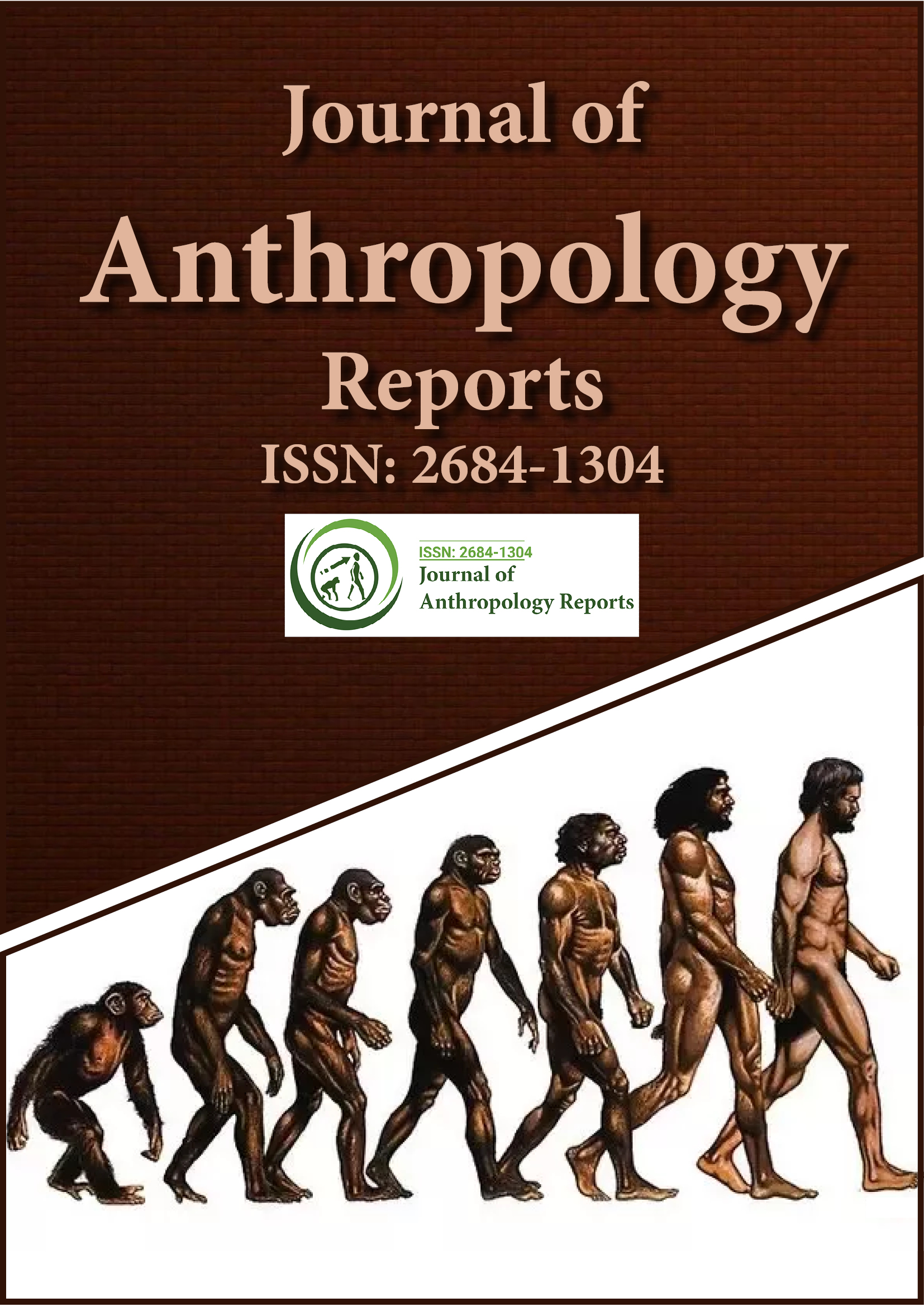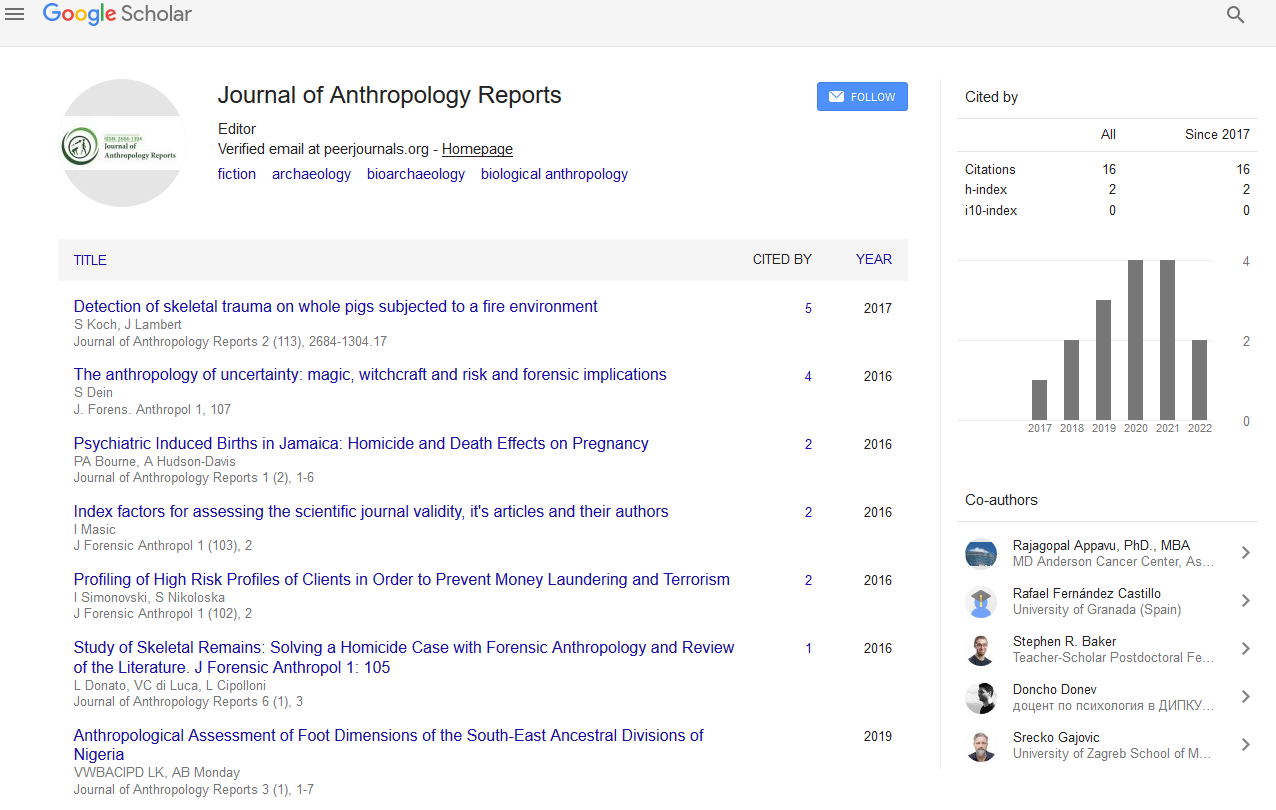Indexed In
- RefSeek
- Hamdard University
- EBSCO A-Z
Useful Links
Share This Page
Journal Flyer

Open Access Journals
- Agri and Aquaculture
- Biochemistry
- Bioinformatics & Systems Biology
- Business & Management
- Chemistry
- Clinical Sciences
- Engineering
- Food & Nutrition
- General Science
- Genetics & Molecular Biology
- Immunology & Microbiology
- Medical Sciences
- Neuroscience & Psychology
- Nursing & Health Care
- Pharmaceutical Sciences
Opinion Article - (2023) Volume 6, Issue 3
Anthropological Investigation: Unraveling the Intricacies of Sociocultural Dynamics
Amelia Kerr*Received: 11-Sep-2023, Manuscript No. JFA-23-23417; Editor assigned: 13-Sep-2023, Pre QC No. JFA-23-23417 (PQ); Reviewed: 27-Sep-2023, QC No. JFA-23-23417; Revised: 06-Oct-2023, Manuscript No. JFA-23-23417 (R); Published: 13-Oct-2023, DOI: 10.35248/2684-1304.23.6.171
Description
Anthropology, the study of humans and their societies, is an invaluable tool for understanding the intricacies of sociocultural dynamics. It delves into the beliefs, practices, norms, and behaviors that shape our societies, providing valuable insights into why people do what they do. In this article, we will explore the significance of anthropological investigation in defining the complexities of sociocultural phenomena and how it contributes to a more informed and empathetic world.
The multifaceted nature of sociocultural dynamics
Sociocultural dynamics encompass a wide range of phenomena, from the rituals of indigenous communities to the behaviors of individuals in modern, globalized societies. It involves examining how culture, beliefs, power structures, and historical contexts influence human interactions and shape the world we live in. Anthropological investigation serves as an identifying understanding of these multifaceted dynamics.
Cultural relativism: One of the fundamental principles of anthropology is cultural relativism, the idea that all cultures are equally valid and should be understood within their own context. This principle encourages us to step outside our own cultural biases and judgments, promoting empathy and a deeper appreciation of diverse worldviews. Anthropologists emphasize the importance of approaching other cultures with an open mind and seeking to understand rather than condemn.
Gender and identity: Anthropology plays an essential role in advancing the complex tapestry of gender and identity. It investigates how societies construct and perceive gender roles, identities, and expressions. By examining the experiences of individuals across different cultures and historical contexts, anthropologists shed light on the fluidity of gender and challenge binary notions. This insight is particularly important in advocating for gender equality and LGBTQ+ rights.
Globalization: In an era of globalization, anthropological investigation helps us navigate the challenges and opportunities presented by interconnected societies. It explores how cultures adapt and transform in response to globalization, from the spread of Western consumerism to the preservation of traditional practices. Understanding these dynamics is important for addressing issues such as cultural appropriation, economic disparities, and environmental sustainability.
Conflict and peace: Anthropology also contributes to conflict resolution and peace-building efforts. By studying the root causes of conflicts, the impact of historical injustices, and the dynamics of intergroup relations, anthropologists provide insights that can inform diplomatic strategies and reconciliation processes. Their research helps bridge divides and promote understanding among conflicting parties.
The role of ethnography
Ethnography, is a characteristic of anthropological investigation, involves immersive fieldwork and participant observation. Anthropologists embed themselves within the communities they study, living alongside individuals and gaining firsthand insights into their lives and perspectives. This method allows for a deep and nuanced understanding of sociocultural dynamics.
Through ethnography, anthropologists can reveal hidden narratives, challenge stereotypes, and reveal the often-overlooked voices of marginalized groups. They document the lived experiences of people, capturing the richness of their cultures and the complexities of their interactions. Ethnographic research is not just about gathering data; it's about building relationships, fostering trust, and respecting the agency of the people being studied.
Conclusion
Anthropological investigation is a powerful tool for deciphering the intricacies of sociocultural dynamics. It challenges us to see the world through different lenses, promotes cultural relativism, and fosters empathy. In an era marked by global challenges and diversity, anthropology offers valuable insights that can informour actions, policies, and interactions. It reminds us that to truly understand the world, we must first seek to understand each other.
Citation: Kerr A (2023) Anthropological Investigation: Unraveling the Intricacies of Sociocultural Dynamics. J Anthropol Rep. 6:171.
Copyright: © 2023 Kerr A. This is an open-access article distributed under the terms of the Creative Commons Attribution License, which permits unrestricted use, distribution, and reproduction in any medium, provided the original author and source are credited.

